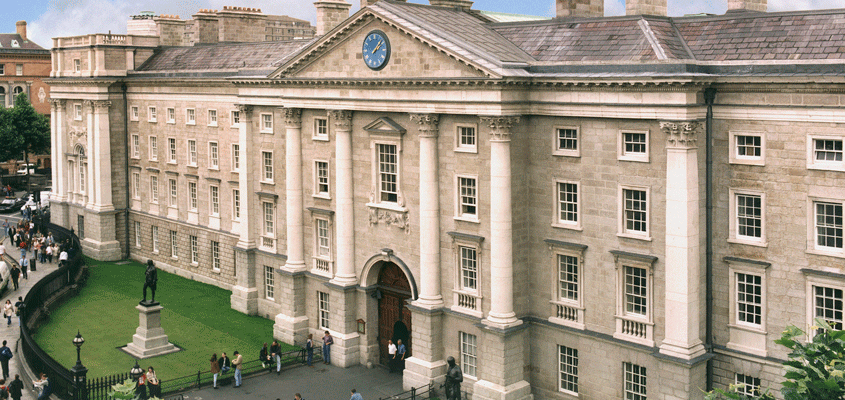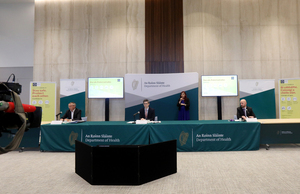From top: Pre-Covid revelry; Special measures for Dublin
This afternoon.
Legal boffins Dr Oran Doyle and Dr David Kenny are members of the COVID-19 Law and Human Rights Observatory at Trinity College Dublin.
Since the rona outbreak, they have studied the ‘divergence between the announcement of restrictive measures and what is actually prohibited by law’.
You may recall Dr Kenny spoke at a recent Oireachtas Special Covid-19 Committee meeting about possible government overreach and lack of clarity.
Of the new restrictions, Doyle and Kenny write on their blog [at link below]:
It is in relation to the [red marked bullet-point, above] that significant divergence emerges between the Regulations and the Government announcement.
As presented by the Government, this measure prohibits more than two households meeting at any time, whether indoors or outdoors, and with a maximum of six people.
Part of this is included in the regulations and is a legal requirement; a large part is not.
Regulation 5A only applies to events in private dwellings. ‘Private dwelling’ is not defined in the Regulations, but the definition of ‘dwelling’ in the primary statute, which refers to a dwelling including a part of a house, strongly implies that the dwelling is the physical structure in which people live.
It seems to follow that there is no legal prohibition on events in, for example, the gardens of private dwellings.
Still less so is there any prohibition on more than one household gathering in public places outside.
The second way in which the Regulations diverge from the Government announcement is that no numerical limit is placed on the number of people from two households who may gather in a private dwelling.
Moreover, Regulation 5A is not deemed to be a penal provision, meaning that breach of the provision— although unlawful — cannot lead to criminal punishment, nor to enforcement powers for the Gardaí. This was notably termed a “civil offence”, though this is not a term with established legal meaning.
They add:
….it is difficult to read the [red marked bullet point] as an announcement of anything other than legal prohibitions. This impression is then enhanced by the fact that some of the measures contained in that bullet-point are now implemented through legal prohibition, while some are entirely absent from the regulations.
It is hard, without skill in compiling and reading secondary legislation, to know what the law truly requires, and so citizens will inevitably be confused as to what the law is and what they are legally required to do.
All back to mine.
FIGHT!
Top Pic: Eventstock








O.M.G. this is beyond idiotic.
Pubs in Dublin are to remain closed…. but the rest of country’s can open.
If you’re in Dublin you are “encouraged to limit travel outside”….
WTF¹? You cannot drink in the county but you are only “encouraged” not to drink outside.
Last DART from Bray into town is going to be jammers!!
¹ What Tom Foolery
Rob, Dav & Co. are slow out of the traps on this one. No mention of ‘Sure what would Dr Oran Doyle and Dr David Kenny know, they’re only members of an observatory’ etc. etc. etc.
Joe, below, has filled the void
This is what happens when you have solicitors interpreting things. They see it all through the narrow prism of whether the guidelines are legal requirements or just requests to behave in a certain way that might help slow the spread of a deadly virus.
The virus is adapting rapidly. The Government can’t be drafting primary or even secondary legislation to provide a legal basis for every guideline. That’s not only not feasible, but its silly. Ultimately Covid will be controlled with the cooperation of the public and not through the exercise of legal powers.
A couple of TCD boffins can write a blog and call themselves the “COVID-19 Law and Human Rights Observatory” but it doesn’t make them an authoritative voice on anything.
“The virus is adapting rapidly” that’s a really good one!!
Let’s look at under a microscope hmmm….. I see this virus is starting to mutate…. I can’t believe it…. it … it’s some type of gigantic mutant bullplop.
SAVE YOURSELVES
I meant to say that our response to the virus is adapting rapidly. I hope you’re more forgiving in person when someone misspeaks.
I’d think being a Professor of Law (Oran Doyle) and an Assistant Professor of Law (David Kenny) does, in fact, make them authoritative voices on legal matters.
You’re missing the point. Viewing this crisis through the narrow prism of the law isn’t very useful to our overall understanding of what’s going on, what we should be doing, and where to go next.
Legalistic interpretations and viewpoints are of very limited value here.
But our approach is not adapting rapidly. If it were we would not be going into level three drama etc. Even the law is unclear as pointed out above.
*Legalistic interpretations and viewpoints are of very limited value here*
But sure they are everything. It is the law or it is not. Seems like most of it cannot be enforced. This just reinforces most peoples view that the Govt don’t have a clue. Competence please if we can find it.
It’s really important to have some real experts to oversee things. Maybe they will be able to ensure there is clarity on what is law and what is guidance. Perhaps, too, they will be able to get the Government to understand the confusion and contradictions in what they are putting out. For example, can a family of two parents and five children go for a walk in the park or is that unacceptable socialising at an outdoor public venue, with people from your own household but in a group greater than the maximum of 6 people. According to the measures outlined, it would be unacceptable but would it be illegal and, if so, what could be the consequences?
At level three, it is even worse:
In your home or garden
Visitors from 1 other household only OR your own household only.
This will be determined by the prevailing public health advice for the county or other defined geographical area.
Other settings outside your home or garden
No social or family gatherings should take place in other settings.
If more than six people from your own household can’t go out together, at present, in Dublin, how are you supposed to interpret ‘No social or family gatherings should take place in other settings’ at level 3 – how many people from the same household can gather or socialise? (Mind you, I suppose you could all join the same sports team and train together in a pod of no more than 15.)
Still no minutes of NPHET meetings for over a month.
It’s time that these members, all of them, are held to account.
What they’re doing and advising should not happen without public accountability and scrutiny now. It’s bad enough that we have an excuse for a Government throwing out inconsistent regulations and guidelines, but these NPHET people are being shielded from accountability and scrutiny.
“Held to account”? What does that mean? They are an appointed Expert Group, they are not public officials. They provide an opinion, nothing else. Their legitimacy lies in their expertise, not any public mandate.
If you want accountability and scrutiny, should we all vote on what restrictions we are willing to endure? How would that work out?
‘They provide an opinion, nothing else. Their legitimacy lies in their expertise, not any public mandate.’
Theoretically true, Joe Small. However, if the Government is going to follow NPHET’s advice, as it very largely does, and if it is going to ignore the advice provided by other experts in the field AND if the public has to abide by the resultant ‘measures’ (a term which avoids the difficulty of clarifying what is advice, guidance or law), then the public should at least have sight of their Minutes.
We do (eventually) get access to the minutes… it is just very slow – running 4 weeks late.
We do, however, get their advice via the CMO in a timely manner:
https://www.gov.ie/en/collection/ba4aa0-letters-from-the-cmo-to-the-minister-for-health/
I think the evidence is now becoming overwhelming that all these government interventions – lockdowns, mass testing, track and trace, etc have had little to no impact on the spread of the virus in most countries.
This idea that we can and must continue to suppress and control the virus indefinitely through more and more restrictive measures is a form of blinkered madness. To quote that article from yesterday’s Telegraph, it would be “the first time in medical history, to arrest the spread of a respiratory, often asymptomatic, infection”.
According to Sunetra Gupta, who’s one of the world’s leading epidemiologists, the way forward is to stop mass testing of the low risk section of society, let them get on with their lives, while taking the steps necessary to protect the vulnerable sector of society. Short clip:
https://twitter.com/bbcquestiontime/status/1306720401356095492
What if one of the steps necessary to protect the vulnerable sector of society is to slow down the transmission of the virus by getting people to limit their social contacts (e.g. lockdown)?
well, Gupta is making the case that rather than impose nationwide or localised lockdowns with the the enormous toll it’s having on society, a better option would be to come up with workable solutions to “aggressively protect” vulnerable individuals. That doesn’t mean completely removing an individual from the rest of society but instead setting up a regular testing regime for people they’ll be in contact with, making sure that those people won’t pass the virus on to the individual.